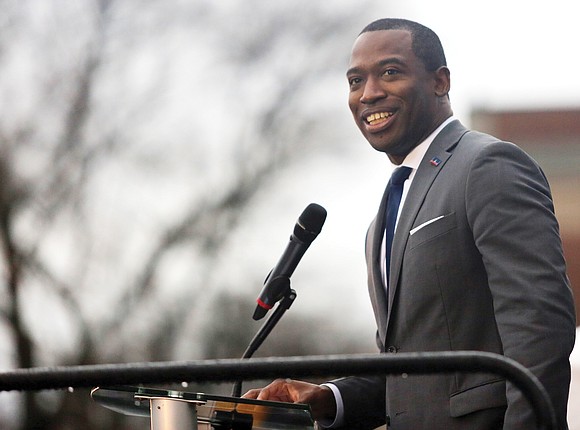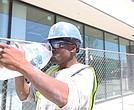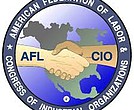2020 Vision
Mayor Stoney reflects on his accomplishments of the past 3 years, his goals for the final year of his term and prospects for re-election
Jeremy M. Lazarus | 1/2/2020, 6 a.m.
Mayor Levar M. Stoney is heading into 2020 confident that Richmond voters will reward him with another four years based on his accomplishments.
Gearing up for re-election — and as yet unchallenged despite signals that others might run — the mayor ticked off the full funding for Richmond Public Schools requests this year, the construction of three new schools, an increase in street paving and the launch of the state’s first Eviction Diversion Program as the top items on his list of notable achievements.
The youngest mayor in city history when he took office in 2017, Mayor Stoney, who will turn 39 in March, talked up the improvements he has ushered in and brushed off rumors that he might seek state office in 2021 during a recent interview at City Hall with the Free Press.
“You will see me on the ballot,” said the mayor, known for his quick smile and fast patter. “And I will fulfill my time, not just this year and this term, but in the second term as well.
“I think I’ve got the best job in the Commonwealth,” he said. “When I wake up, it challenges me each and every day. This city has grown, but I also see myself as growing in this role as well. I will be a better mayor in year 4 than I was in year 1. And I’ll be a better mayor in year 8 than I will be in year 5.”
He won a four-way race four years ago to secure the position. At the moment, the only potential opponent being mentioned for the November contest is 2nd District Councilwoman Kim B. Gray, though she has not said if she will run for mayor or seek re-election to City Council.
On the campaign trail and if re-elected, Mayor Stoney said he plans to use the same approach that helped him win the office.
He said he would “lean into my ‘One Richmond’ agenda and the pillars of ‘One Richmond,’ more investment in improving public education, more investment in affordable housing, more investment in mass transit and public transportation and more investment in job creation and workforce development.”
He has taken heat for pushing for tax increases to provide more revenue to make such investments.
While he lost a bid to increase the city’s real estate property tax, he succeeded in getting City Council to pass a 1.5 percent hike in the local meals tax on restaurant and other prepared food to finance construction of three new schools that will open in September. He also secured passage of the city’s first tax on cigarettes, a 50-cent tax that is expected to raise about $3 million in new revenue.
As he prepares the next Richmond budget for presentation in March, he would not rule out another tax increase. “Every option is on the table,” he said.
However, he added, “I’m not silly. I recognize that City Council has rejected proposals for raising the real estate tax rate. I’m keeping that in mind. And just because all options are on the table doesn’t mean I will be proposing a tax increase.”
He said, though, it would be irresponsible of him not to look at all the options during the budget preparation process.
The mayor also said he would continue lobbying efforts in the state legislature to secure more funding for public schools, road improvements and public transit.
“We can’t tackle it alone,” he said, and would need help “from our friends in the General Assembly.”
The biggest item on his to-do list remains the $1.5 billion Richmond Coliseum replacement plan that he has spent much of his first term spearheading with the Navy Hill District Corp. and its leader, Thomas F. Farrell II, the top executive at Richmond-based utility giant Dominion Energy.
Mayor Stoney has yet to gain approval from City Council, but he remains upbeat about the prospects ahead of the council’s scheduled vote in late February.
While he currently appears to be falling short of securing the seven votes needed to propel the project, he is not ready to throw in the towel.
“I am one of the most optimistic public servants you will find, and I remain optimistic that the plan for Navy Hill stands on its own merits,” Mayor Stoney said.
“My hope for 2020, my wish is that council will strengthen this project so we can get to a ‘yes,’ ” he said. “If they have concerns, if they have issues, we need to hear about them so we can create a compromise that benefits everyone. This is a transformative project. This is not about buildings. This is about economic empowerment. This is about people. ‘No’ is not a plan for success.”
If the Navy Hill project should go down, however, he’s prepared. He said he would be revving up the long-stalled plan to redevelop 60 acres of city property at Arthur Ashe Boulevard and Robin Hood Road near The Diamond. The city invested $19 million to clear city and school operations from the site.
But the city put that development on hold while waiting for the governor and General Assembly to approve a plan to replace the state Alcohol Beverage Control headquarters and warehouse on Hermitage Road, which finally is happening.
Once the ABC relocates to new suburban quarters on which construction is beginning, Virginia Commonwealth University is on track to obtain the old site for development of a new baseball stadium to be used by the university’s team and the Richmond Flying Squirrels.
Mayor Stoney confirmed rumors that the city’s development staff is expected to issue a request for proposals this spring to seek a master developer for the property.
In the interview, he pledged there would be a more public process before decisions are made on what would be developed, a contrast with the secretive approach the administration initially followed with the Navy Hill development that has drawn fire from critics.
He said nearby residents and business owners would need to be consulted and enabled to offer their views on what should be developed as part of the process. He said the city also would need to work with VCU, which he said also will likely own the Sports Backers track and field stadium that currently is on a portion of the site.
And Richmond Public Schools would need to be involved, he said, as the current owner of the Arthur Ashe Jr. Athletic Center, which occupies a key corner.
At this point, there is no plan for replacing the Ashe Center, which is in declining condition.
“We all believe that the schools deserve a better facility,” he said in calling the Ashe Center an example of the deferred maintenance of city property.
Whether he wins re-election or not, Mayor Stoney believes he has made an impact as he begins the final year of his term. He notes with pride his work with City Council to provide Richmond Public Schools with $19 million in additional operating funds and $18 million in additional funds for maintenance. That $37 million increase in funding is the largest amount of new money provided to schools in at least 20 years, he said, and is coupled with the $150 million earmarked to yield two new elementary schools and one new middle school this fall.
“This was my No. 1 priority. I ran as the education mayor and I’m elated that we achieved full funding not only for academics, but in the facilities that kids walk into everyday,” he said.
He acknowledged, however, that it would be tough to continue to provide such increases every year. Still, he’s happy that it was done for at least one year.
“As we go into 2020, we obviously are expecting results. But I believe we have put RPS on a path for success, and that is what we were charged to do.”
He also believes that Richmond’s efforts at eviction diversion will pay off with fewer families losing their homes.
“Richmond ranks No. 2 in the country in the percentage of our residents being evicted,” he said. “As good governments do, you have to respond.” The city’s response is a safety net program that already has worked with 56 families and is getting increasing calls to help others.
Through the program, “pro bono attorneys have been activated to respond to the needs,” and a separate Eviction Task Force that includes apartment managers, landlords, tenants and nonprofits is seeking to “to come up with solutions to prevent evictions,” he said.
The root of the problem, though, is the rising cost of housing in the city, he said, which he said will require more investment in the creation of quality housing that is more affordable.
As a result, looking ahead, he sees plenty more to do.







